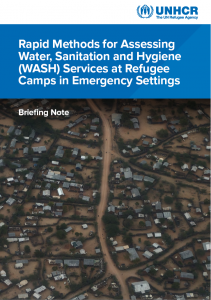
This document describes UNHCR’s methodology for conducting rapid WASH household assessments in refugee settings.
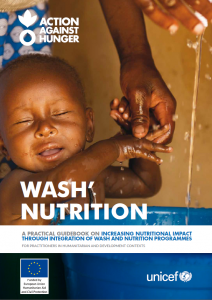
A practical guidebook on increasing nutritional impact through integration of WASH and Nutrition programmes. It is meant for practitioners in humanitarian and development contexts.
Tags: Capacity Building, Child Friendly Facilities, Cross Cutting, Excreta Management, Human Right to Water / Sanitation, Hygiene Promotion, Protection, Solid Waste Management, WASH Assessments, WASH Coordination, WASH Monitoring, WASH Programme Health and Safety, WASH Strategy Development, and Water Supply. Locations: Africa, Asia and the Pacific, Central Asia, Europe, Middle East, and South-West Asia. Languages: English. Organisations: ACF and UNICEF. Categories: WASH Policy Guidelines and WASH Reference Documents.
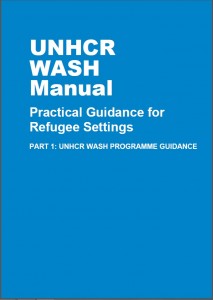
The UNHCR WASH Manual Part 1: Programme Guidance, provides practical guidance for WASH programmes in refugee settings.
Tags: Camp Closure, camp management, Capacity Building, CASH Interventions, Child Friendly Facilities, Cold Climates, Cross Cutting, Disability, Environment, Gender, Gender Based Violence, Human Right to Water / Sanitation, Protection, Value for Money, WASH Assessments, WASH Coordination, WASH Monitoring, WASH Programme Health and Safety, WASH Programme Management, WASH Reporting, and WASH Strategy Development. Languages: English. Organisations: UNHCR. Categories: WASH Manual, WASH Operational Guidelines, WASH Policy Guidelines, and WASH Reference Documents.
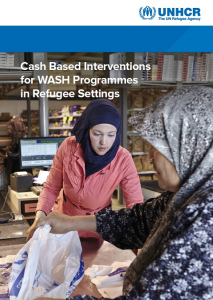
This report is based on a desk-based review of secondary data, comprising published material as well as grey literature, supplemented with key informant interviews for programmes that lacked documentation. Section One summarises the current use of CBI in WASH programming. Section Two summarises the best practices and lessons learned including challenges faced, drawing on evidence from the project examples found. Section Three provides recommendations and best practice guidance for use of CBI in refugee settings. Section Four details existing tools and guidance.
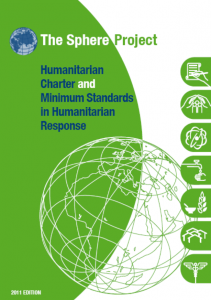
The Sphere Handbook is one of the most widely known and internationally recognized sets of common principles and universal minimum standards for the delivery of quality humanitarian response.
Tags: Bathing Facilities, Capacity Building, Communal Toilets, Cross Cutting, Disability, Disease Vector Control, Drainage, Environment, Excreta Management, Gender, Gender Based Violence, Grey Water Disposal, Handwashing with Soap, Household Water Treatment, Human Right to Water / Sanitation, Hygiene Promotion, Laundering Facilities, Menstruation Hygiene Management, Piped Water Networks, Protection, Public Health, Solid Waste Management, WASH Assessments, WASH Coordination, WASH Monitoring, WASH Programme Management, Water Quality Testing and Surveillance, Water Safety Plans, and Water Supply. Languages: English. Organisations: SPHERE. Categories: WASH Reference Documents.
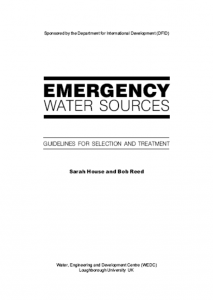
These guidelines have been designed to help those involved in the assessment of emergency water sources to collect relevant information in a systematic way, to use this information to select a source or sources and to determine the appropriate level of treatment required to make the water suitable for drinking.
Tags: Boreholes, Bulk Water Treatment, Drilling, Groundwater, Hand Dug Wells, Handpumps, Household Water Treatment, Piped Water Networks, Rainwater Harvesting, Solar Pumping, Spring Protection, WASH Assessments, WASH Monitoring, WASH Programme Management, Water Prospection and Investigation, Water Pumping, Water Quality Testing and Surveillance, Water Safety Plans, Water Storage, Water Supply, and Water Tankering. Languages: English. Organisations: WEDC. Categories: WASH Emergency Guidelines and WASH Reference Documents.
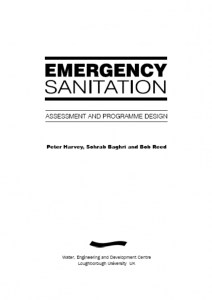
The book Emergency Sanitation: Assessment and programme design has been produced to assist those involved in planning and implementing emergency sanitation programmes. The main focus of the book is a systematic and structured approach to assessment and programme design. It provides a balance between the hardware (technical) and software (socio-cultural, institutional) aspects of sanitation programmes, and links short-term emergency response to long-term sustainability. The book is relevant to a wide range of emergency situations, including both natural and conflict-induced disasters, and open and closed settings. It is suitable for field technicians, engineers and hygiene promoters, as well as staff at agency headquarters.
Tags: Communal Toilets, Desludging and Excreta Transportation, Excreta / Urine ReUse, Excreta Composting, Excreta Management, Excreta Treatment, Household Toilets, Sewerage and Excreta Conveyance, WASH Assessments, WASH Monitoring, and WASH Programme Management. Languages: English. Organisations: WEDC. Categories: WASH Emergency Guidelines and WASH Reference Documents.
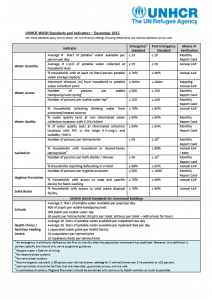
A summary of UNHCR water, excreta management, solid waste management, disease vector control and hygiene promotion standards and indicators for emergency and post emergency refugee settings including means of verification.
Tags: Bathing Facilities, Disease Vector Control, Drainage, Excreta Management, Handwashing with Soap, Hygiene Promotion, Solid Waste Management, WASH Assessments, WASH Monitoring, WASH Strategy Development, Water Quality Testing and Surveillance, and Water Supply. Languages: English. Organisations: UNHCR. Categories: WASH Indicators and Standards.
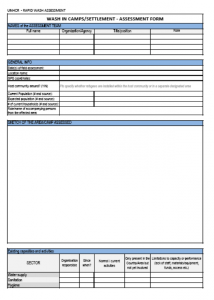
These rapid (emergency) assessment tools can be used to help assess water supply, excreta management, solid waste management, hygiene and disease vector control conditions in the following refugee settings: These rapid (emergency) assessment tools can be used to help assess water supply, excreta management, solid waste management, hygiene and disease vector control conditions in the following refugee settings: Camps; Settlements; Transit Centres; Schools; Health Centres and Urban Settlements. It also contains references to UNHCR’s WASH indicators and recommendations for data collection.
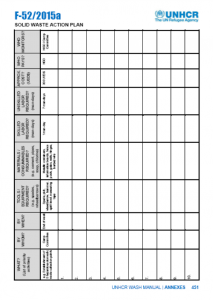
Where required, UNHCR and WASH actors may use this template to develop a solid waste management action plan that describes a list of prioritised solid waste management activities in addition to WHO, WHAT, WHERE, WHEN and HOW they will be carried out.
 English
English










